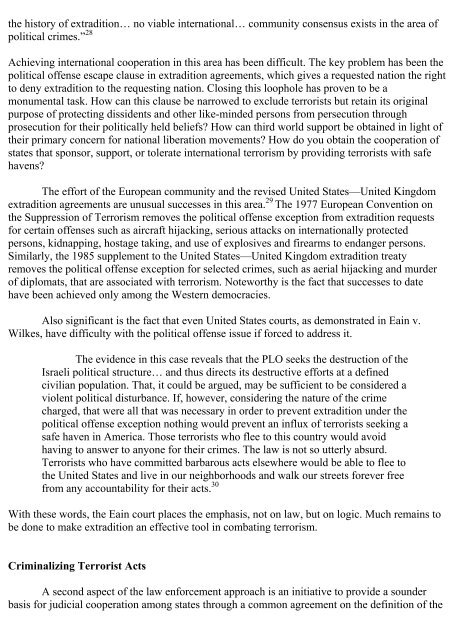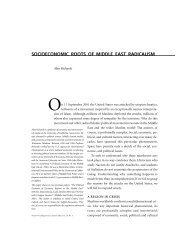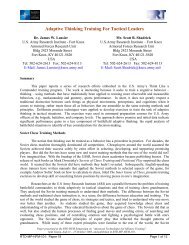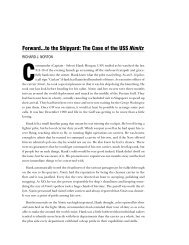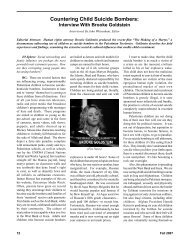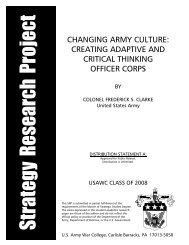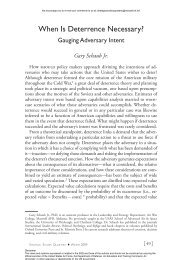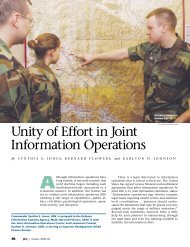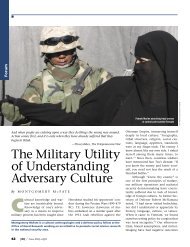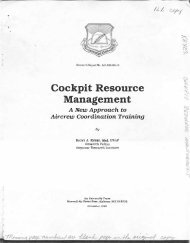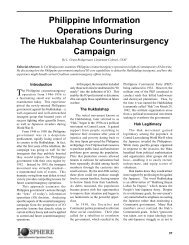Legitimate use of military force against state-sponsored - Air University
Legitimate use of military force against state-sponsored - Air University
Legitimate use of military force against state-sponsored - Air University
You also want an ePaper? Increase the reach of your titles
YUMPU automatically turns print PDFs into web optimized ePapers that Google loves.
the history <strong>of</strong> extradition… no viable international… community consensus exists in the area <strong>of</strong><br />
political crimes.” 28<br />
Achieving international cooperation in this area has been difficult. The key problem has been the<br />
political <strong>of</strong>fense escape cla<strong>use</strong> in extradition agreements, which gives a requested nation the right<br />
to deny extradition to the requesting nation. Closing this loophole has proven to be a<br />
monumental task. How can this cla<strong>use</strong> be narrowed to exclude terrorists but retain its original<br />
purpose <strong>of</strong> protecting dissidents and other like-minded persons from persecution through<br />
prosecution for their politically held beliefs? How can third world support be obtained in light <strong>of</strong><br />
their primary concern for national liberation movements? How do you obtain the cooperation <strong>of</strong><br />
<strong>state</strong>s that sponsor, support, or tolerate international terrorism by providing terrorists with safe<br />
havens?<br />
The effort <strong>of</strong> the European community and the revised United States—United Kingdom<br />
extradition agreements are unusual successes in this area. 29 The 1977 European Convention on<br />
the Suppression <strong>of</strong> Terrorism removes the political <strong>of</strong>fense exception from extradition requests<br />
for certain <strong>of</strong>fenses such as aircraft hijacking, serious attacks on internationally protected<br />
persons, kidnapping, hostage taking, and <strong>use</strong> <strong>of</strong> explosives and firearms to endanger persons.<br />
Similarly, the 1985 supplement to the United States—United Kingdom extradition treaty<br />
removes the political <strong>of</strong>fense exception for selected crimes, such as aerial hijacking and murder<br />
<strong>of</strong> diplomats, that are associated with terrorism. Noteworthy is the fact that successes to date<br />
have been achieved only among the Western democracies.<br />
Also significant is the fact that even United States courts, as demonstrated in Eain v.<br />
Wilkes, have difficulty with the political <strong>of</strong>fense issue if <strong>force</strong>d to address it.<br />
The evidence in this case reveals that the PLO seeks the destruction <strong>of</strong> the<br />
Israeli political structure… and thus directs its destructive efforts at a defined<br />
civilian population. That, it could be argued, may be sufficient to be considered a<br />
violent political disturbance. If, however, considering the nature <strong>of</strong> the crime<br />
charged, that were all that was necessary in order to prevent extradition under the<br />
political <strong>of</strong>fense exception nothing would prevent an influx <strong>of</strong> terrorists seeking a<br />
safe haven in America. Those terrorists who flee to this country would avoid<br />
having to answer to anyone for their crimes. The law is not so utterly absurd.<br />
Terrorists who have committed barbarous acts elsewhere would be able to flee to<br />
the United States and live in our neighborhoods and walk our streets forever free<br />
from any accountability for their acts. 30<br />
With these words, the Eain court places the emphasis, not on law, but on logic. Much remains to<br />
be done to make extradition an effective tool in combating terrorism.<br />
Criminalizing Terrorist Acts<br />
A second aspect <strong>of</strong> the law en<strong>force</strong>ment approach is an initiative to provide a sounder<br />
basis for judicial cooperation among <strong>state</strong>s through a common agreement on the definition <strong>of</strong> the


